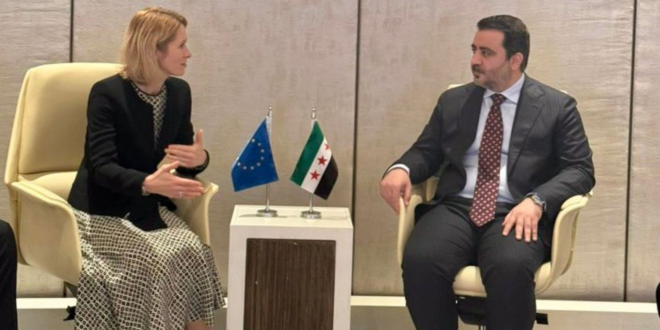Germany, Italy, the Netherlands, and Austria have reportedly drafted a joint memorandum calling for the lifting of restrictions on the Central Bank of Syria and other financial institutions, Enab Baladi says,
In a notable shift in European policy toward post-Assad Syria, the European Union’s top foreign affairs official, Kaja Kallas, has proposed a new package of sanctions relief that would allow EU member states to fund Syrian government ministries—including the Ministries of Defence and Interior—in limited areas such as reconstruction, capacity-building, counterterrorism, and migration management.
The confidential proposal, outlined in a document dated May 14 and reviewed by Reuters, signals what EU diplomats describe as a “more flexible approach” to re-engagement with Syria in light of the country’s ongoing political transition and growing regional normalization.
Toward a New European Framework on Syria
The proposal, which is set to be formally discussed by EU foreign ministers at a meeting next week in Brussels, represents a gradual recalibration of the bloc’s Syria policy. While the EU has already relaxed certain restrictions—particularly those affecting energy, transportation, and early recovery initiatives—this latest plan would mark the first time Brussels authorizes engagement with Syria’s sovereign ministries in sectors long considered off-limits.
According to the document, EU member states would be granted discretion to cooperate with Syrian ministries on a case-by-case basis, particularly when such engagement is deemed essential for regional security, humanitarian stabilization, or migration management.
The move reflects growing momentum within Europe to adapt to new political realities following the fall of Bashar al-Assad and the emergence of a transitional government led by President Ahmad al-Sharaa.
France Leads the Push
French President Emmanuel Macron, who hosted President Sharaa in Paris earlier this month, has publicly endorsed the easing of sanctions, stating that “Paris will press for an end to European sanctions when they come up for renewal.” The current EU sanctions—first imposed in 2011 and renewed annually—are set to expire on June 1.
Diplomatic efforts are also gaining traction behind the scenes. Germany, Italy, the Netherlands, and Austria have reportedly drafted a joint memorandum calling for the lifting of restrictions on the Central Bank of Syria and other financial institutions. The initiative argues that such measures are essential to “create space for socioeconomic recovery.”
Focus on Institutional Recovery, Not Regime Rehabilitation
Critically, the proposal maintains restrictions on individuals linked to the Assad-era regime, particularly those accused of war crimes and corruption. However, it introduces exemptions for dealings with Syrian state entities in cases where engagement supports humanitarian or security goals, such as the dismantling of remaining chemical weapons stockpiles or the restoration of basic services.
The European Commission is also weighing the removal of sanctions on the state-owned Commercial Bank of Syria while keeping targeted sanctions on individuals associated with the former regime’s repressive apparatus.
One EU official told Reuters that the objective is “to allow greater flexibility in assisting Syria’s reconstruction without legitimizing those responsible for its destruction.”
Reconstruction Needs Estimated at $250 Billion
The World Bank estimates that Syria will require over $250 billion to rebuild its shattered infrastructure and economy. In recent months, the transitional government has intensified efforts to secure European support for reconstruction, humanitarian aid, and reintegration into the global financial system.
With regional powers such as Saudi Arabia, the United Arab Emirates, Qatar, and Turkey already restoring ties and offering technical and financial assistance, European leaders face mounting pressure to ensure the EU remains a relevant actor in shaping Syria’s post-conflict future.
Outlook: Pragmatic Engagement with Guardrails
As Syria continues its transition toward political normalization and institutional rebuilding, the EU’s evolving stance could prove decisive. The proposed revisions reflect an attempt to balance the need for accountability with the imperative of engagement.
While the proposal’s fate remains uncertain pending consensus among the EU’s 27 member states, the trajectory is increasingly clear: the era of blanket isolation is giving way to a more nuanced and pragmatic approach—one that seeks to support recovery while upholding human rights and democratic principles.
If adopted, the initiative could open the door to broader cooperation on security, migration, and development—areas where Europe has a direct and enduring stake in Syria’s long-term stability.
 Eurasia Press & News
Eurasia Press & News




